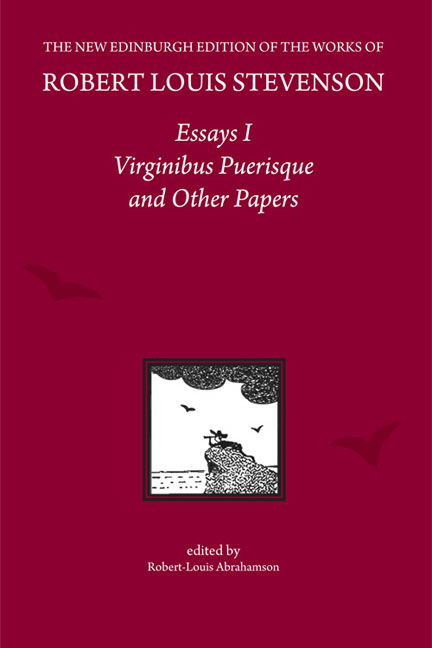Book contents
- Frontmatter
- Contents
- Acknowledgements
- Preface by the General Editors
- List of Abbreviations
- Chronology of Robert Louis Stevenson
- Stevenson’s Essays
- Stevenson as Essayist
- Introduction
- VIRGINIBUS PUERISQUE AND OTHER PAPERS
- Appendices
- Note on the Text
- Emendation List
- End-of-Line Hyphens
- Explanatory Notes
Pan’s Pipes
Published online by Cambridge University Press: 11 November 2020
- Frontmatter
- Contents
- Acknowledgements
- Preface by the General Editors
- List of Abbreviations
- Chronology of Robert Louis Stevenson
- Stevenson’s Essays
- Stevenson as Essayist
- Introduction
- VIRGINIBUS PUERISQUE AND OTHER PAPERS
- Appendices
- Note on the Text
- Emendation List
- End-of-Line Hyphens
- Explanatory Notes
Summary
THE WORLD IN which we live has been variously said and sung by the most ingenious poets and philosophers: these reducing it to formulæ and chemical ingredients, those striking the lyre in high-sounding measures for the handiwork of God. What experience supplies is of a mingled tissue, and the choosing mind has much to reject before it can get together the materials of a theory. Dew and thunder, destroying Atilla and the Spring lambkins, belong to an order of contrasts which no repetition can assimilate. There is an uncouth, outlandish strain throughout the web of the world, as from a vexatious planet in the house of life. Things are not congruous and wear strange disguises: the consummate flower is fostered out of dung, and after nourishing itself awhile with heaven's delicate distillations, decays again into indistinguishable soil; and with Cæsar's ashes, Hamlet tells us, the urchins make dirt pies and filthily besmear their countenance. Nay, the kindly shine of summer, when tracked home with the scientific spyglass, is found to issue from the most portentous nightmare of the universe— the great, conflagrant sun: a world of hell's squibs, tumultuary, roaring aloud, inimical to life. The sun itself is enough to disgust a human being of the scene which he inhabits; and you would not fancy there was a green or habitable spot in a universe thus awfully lighted up. And yet it is by the blaze of such a conflagration, to which the fire of Rome was but a spark, that we do all our fiddling, and hold domestic tea-parties at the arbour door.
The Greeks figured Pan, the god of Nature, now terribly stamping his foot, so that armies were dispersed; now by the woodside on a summer noon trolling on his pipe until he charmed the hearts of upland ploughmen. And the Greeks, in so figuring, uttered the last word of human experience. To certain smoke-dried spirits matter and motion and elastic aethers, and the hypothesis of this or that other spectacled professor, tell a speaking story; but for youth and all ductile and congenial minds, Pan is not dead, but of all the classic hierarchy alone survives in triumph; goat-footed, with a gleeful and an angry look, the type of the shaggy world: and in every wood, if you go with a spirit properly prepared, you shall hear the note of his pipe.
- Type
- Chapter
- Information
- Essays IVirginibus Puerisque and Other Papers, pp. 106 - 109Publisher: Edinburgh University PressPrint publication year: 2018



